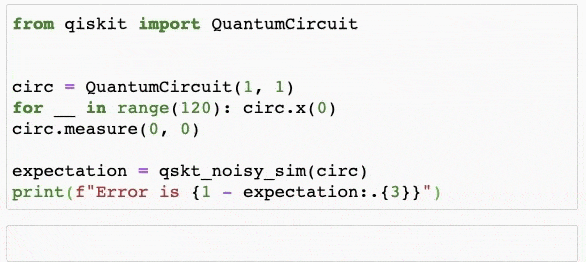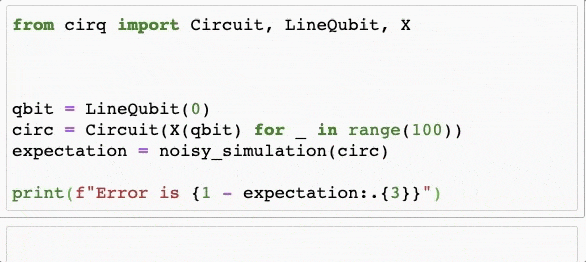Mitiq is a Python toolkit for implementing error mitigation techniques on quantum computers.
Current quantum computers are noisy due to interactions with the environment, imperfect gate applications, state preparation and measurement errors, etc. Error mitigation seeks to reduce these effects at the software level by compiling quantum programs in clever ways.
Want to know more? Check out our documentation.
Mitiq can be installed from PyPi via
pip install mitiqTo build from source, see these installation instructions. To test installation, run
import mitiq
mitiq.about()This prints out version information about core requirements and optional quantum software packages which Mitiq can interface with.
If you would like to contribute to Mitiq, check out the contribution guidelines for more information.
Mitiq can currently interface with:
Cirq is a core requirement of Mitiq and is automatically installed. To use Mitiq with other quantum programming libraries, install the optional package(s) following the instructions linked above.
Mitiq can be used on any quantum processor which can be accessed by supported quantum programming libraries and is available to the user.
See the getting started guide in Mitiq's documentation for a complete walkthrough of how to use Mitiq. For a quick preview, check out the following snippet:
import numpy as np
from cirq import depolarize, Circuit, DensityMatrixSimulator, LineQubit, X
from mitiq.zne import execute_with_zne
def noisy_simulation(circ: Circuit) -> float:
"""Simulates a circuit with depolarizing noise.
Args:
circ: The quantum program as a Cirq Circuit.
Returns:
The expectation value of the |0><0| observable.
"""
circuit = circ.with_noise(depolarize(p=0.001))
rho = DensityMatrixSimulator().simulate(circuit).final_density_matrix
return np.real(np.trace(rho @ np.diag([1, 0])))
# simple circuit that should compose to the identity when noiseless
circ = Circuit(X(LineQubit(0)) for _ in range(80))
# run the circuit using a density matrix simulator with depolarizing noise
unmitigated = noisy_simulation(circ)
print(f"Error in simulation (w/o mitigation): {1.0 - unmitigated:.{3}}")
# run again, but using mitiq's zero-noise extrapolation to mitigate errors
mitigated = execute_with_zne(circ, noisy_simulation)
print(f"Error in simulation (with mitigation): {1.0 - mitigated:.{3}}")Sample output:
Error in simulation (w/o mitigation): 0.0506
Error in simulation (with mitigation): 0.000519
Mitiq currently implements:
- Zero-Noise Extrapolation,
- Probabilistic Error Cancellation,
- (Variable noise) Clifford data regression,
and is designed to support additional techniques.
Mitiq's documentation is hosted at mitiq.readthedocs.io.
We welcome contributions to Mitiq including bug fixes, feature requests, etc. Please see the contribution guidelines for more details. To contribute to the documentation, please see these documentation guidelines.
An up-to-date list of authors can be found here.
We look forward to adding new features to Mitiq. If you have a proposal for implementing a new quantum error mitigation technique, or adding an example used in your research, please read our guidelines for contributing.
If you use Mitiq in your research, please reference the Mitiq preprint as follows:
@misc{larose2020mitiq,
title={Mitiq: A software package for error mitigation on noisy quantum computers},
author={Ryan LaRose and Andrea Mari and Peter J. Karalekas
and Nathan Shammah and William J. Zeng},
year={2020},
eprint={2009.04417},
archivePrefix={arXiv},
primaryClass={quant-ph}
}A list of papers citing Mitiq can be found here.
Mitiq is participating in unitaryHACK, check
out and contribute on open issues labeled
unitaryhack!
Thanks goes to these wonderful people (emoji key):
This project follows the all-contributors specification. Contributions of any kind welcome!







